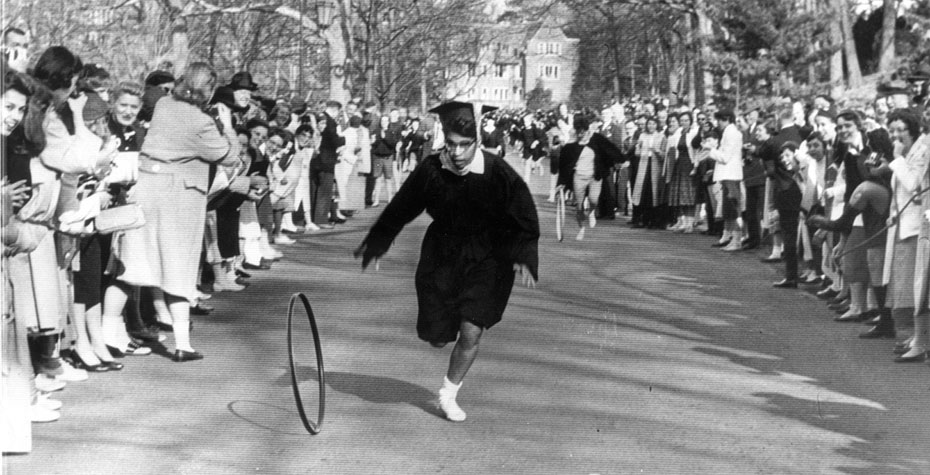An April 16 Event Celebrates the Collection and the Plans to Move It to College Archives

At 7 p.m. on April 16, women will gather in the living room of Tower Court to talk about two related experiences: being a student of African descent at Wellesley in the 1950s, and being a participant in a project collecting oral histories about that time and place. Several of the alumnae who gave oral histories will be present to speak about the collection, including Lois Leatherman Driver '57, Ruth-Arlene Wood Howe '55, and Shirlee Haizlip '59. The collection is titled Oral Histories from Wellesley Alumnae of African Descent of the Pre-Ethos Era.
The event, called Quiet As It’s Kept, is free and open to the public, and is the brainchild of Nora Mishanec ’14. But it was not, she is quick to point out, a single-handed effort.
The project began when Mishanec was taking Assistant Professor of History Brenna Greer’s course, Modern Black Freedom Struggle. Greer asked the class to record and analyze one oral history. Mishanec found the assignment so compelling she recorded two oral histories with founders of Ethos, an organization for students of African descent at Wellesley College founded in 1967 to provide political, social, and academic support for these students. Mishanec says, “The course dismantled the standard Civil Rights narrative…. It was exhilarating to become so absorbed in one topic. Additionally, I had found a mentor in Professor Greer.”
By coincidence, a month later Mishanec met Lois Leatherman Driver ’57 while she was working at Reunion and was assigned to the Class of 1957. With Greer’s assignment still fresh in her mind, she approached Leatherman and her daughter Candis about recording an oral history. The two agreed. “That was the very beginning,” says Mishanec. “It just snowballed from there.”
So far, oral histories have been collected with:
- Miriam DeCosta-Willis ’56
- Lois Leatherman Driver ’57
- Shirlee Taylor Haizlip ’59
- Trudy Hatter ’59
- Ruth-Arlene Wood Howe ’55
- Amalya Kearse ’59
- Cecile Springer ’54 (master’s degree)
Mishanec contacted Barbara Loomis Jackson ’50 about the possibility of doing an oral history and learned that Jackson’s granddaughter, Michaela Jackson-Smith ’16, is at Wellesley now. “I immediately emailed Mikey and we had lunch,” tells Mishanec. “Mikey was very excited to learn about the project, and she made plans to conduct an oral history with her grandmother.” Sadly, Jackson passed away before that could happen. Jackson-Smith has remained involved with the project, however; she and Mishanec jointly conducted the oral history with Ruth-Arlene Wood Howe '55, and she may continue the research when Mishanec graduates in May.
The work has sometimes been daunting, Mishanec admits, and credits the support she got from professors and mentors. “Professor Greer told me repeatedly, I had to learn to think like a historian. The women had important stories to tell—stories that aren’t always included in the Wellesley narrative—and that was my driving force.” In November 2013, Mishanec won a Pamela Daniels ’59 Fellowship to facilitate her “dream project.”
The oral histories will find a home in the College Archives. Most will be publicly available, or will be available in future, depending upon the wishes of the subject.
“The more I hear from alumnae of African descent, the more strongly I feel that their stories belong in the archives for other students to hear,” says Mishanec. “The benefit to the College is substantial, especially when one considers the current efforts to become a more diverse and multicultural institution.”
The April 16 event is sponsored by the Alumnae Association, American Studies, Department of Africana Studies, and Harambee House. Mishanec emphasizes the collective nature of the entire effort, saying, “Many alumnae have welcomed me into their homes and participated; Dr. Greer and Dr. Tracey Cameron [director of Harambee House] have supported the project for two years; members of Ethos have worked with me to come up with questions; Mikey has been a valuable partner; Provost Shennan enabled the project with two grants; Pamela Daniels has been a source of guidance. There is an entire community behind the oral history project.”
